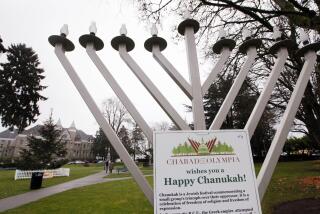Bid by Black Hebrew Sect to Stay in Israel Rejected
JERUSALEM — Israel’s supreme court today rejected a petition of the tiny American-born Black Hebrew sect to stay in Israel, opening the way for the deportation of the group, which has lived in the Jewish state for 17 years.
Forty-six members of the sect were arrested in April while working at a packaging plant and issued deportation orders, which they appealed in court.
An Interior Ministry official said it was unclear how soon the 46 will be expelled or whether Israel would deport the rest of the 1,500-member sect, who claim descent from the ancient Israelite tribe of Judah.
The Black Hebrews, made up largely of blacks from Chicago and other U.S. cities, follow a set of beliefs that allow men to take more than one wife. They have never been recognized as Jewish under Israeli law, which grants automatic citizenship to Jews.
Israeli officials, fearing that they could be labeled racist, have in the past unhappily tolerated the presence of the sect, which lives a semi-communal life in Israel’s Negev desert.
Heightened Efforts
They say the deportations are part of heightened efforts to expel all illegal aliens in Israel.
Israel also fears that some of the sect’s 25,000 members living in America could try to join their brethren in Israel.
The Black Hebrews argued in court that their long stay in Israel gave them a de facto status as tolerated people and that it should be unchanged, their lawyer, Mark Levy, said.
“The Interior Ministry has been given a green light to pick up these people left and right and ship them home,” Levy said after the decision.
Three more Black Hebrews were arrested earlier this week in Tel Aviv. One of them, Leon Lenot Dobbs from Oklahoma, already has been deported, Levy said.
Many members of the sect renounced American citizenship and became stateless to pressure Israel into giving them citizenship and to make their deportation more difficult.
More to Read
Sign up for Essential California
The most important California stories and recommendations in your inbox every morning.
You may occasionally receive promotional content from the Los Angeles Times.









